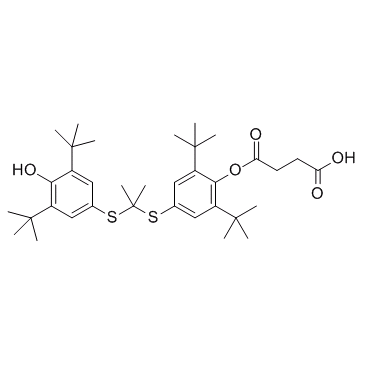| References: |
In Vitro:
Succinobucol (10, 50, 100 μM) causes a dose-dependent reduction in collagen-induced platelet aggregation in rabbit whole blood. Succinobucol also causes a significant reduction in whole blood aggregation in response to ADP. Succinobucol (10, 100 μM) significantly lowers the relaxation to X/XO. Succinobucol significantly prevents 3-NP-induced loss of SH-SY5Y cell viability, generation of reactive oxygen species, and decrease of ΔΨm. Succinobucol does not protect against 3-NP-induced inhibition of mitochondrial complex II activity, pointing to the mitigation of secondary events resultant from mitochondrial complex II inhibition. Succinobucol significantly increases (50 %) the levels of GSH in SH-SY5Y cells, which is paralleled by significant increases in glutamate cysteine ligase messenger RNA (mRNA) expression and activity. Succinobucol effectively exhibits superior inhibitory effects on cell migration and invasion activities, VCAM-1 expression and cell-cell binding of RAW 264.7 to 4T1 cells. Succinobucol also shows inhibitory effect on VCAM-1 expression in 4T1 cells and cell-cell binding of RAW 264.7 to 4T1 cancer cells.
In Vivo:
Succinobucol (50, 100, and 150 mg/kg, i.v.) has no significant effect on either heart rate or MAP, but the blood removed 15 minutes after the final injection of succinobucol shows significantly less aggregation in response to collagen at both 5 µg/mL and 20 µg/mL in rats. Succinobucol (40 mg/kg) by tail injection significantly reduces the average number of metastatic nodules in lung metastatic breast cancer mice. |























